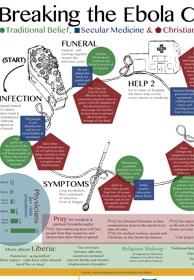Related Articles
Why Africa’s Transformation Waits
The root of development failure in Africa is a faulty world view.
Daniel as a Model for Godly Living in Creative Access Countries
Four stories from the Book of Daniel serve as examples to those serving God in creative access countries.
Territorial Spirits and World Missions
The subject of territorial spirits and world missions is surfacing on the agendas of many church, seminary, and mission leaders.
Territorial Spirits and World Missions
The subject of territorial spirits and world missions is surfacing on the agendas of many church, seminary, and mission leaders.
Breaking the Ebola Cycle
The Ebola epidemic in West African countries like Liberia is a terrible tragedy that has captured global attention and response. Explore the cycle of Ebola in Liberia and consider how traditional belief and secular medicine are responding. Then pray about the Christian response that is presented and how that might impact your engagement with the crisis.

